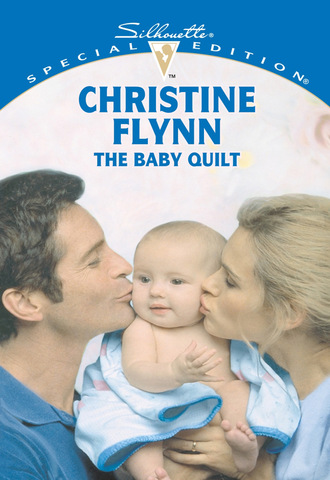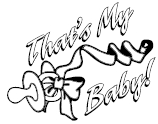
Полная версия
The Baby Quilt


He could see her sitting on her bed with little Anna in her arms.
She was looking down at the child, her finger slowly stroking a rounded little cheek, the alabaster slope of her breast visible between the sides of her pink shirt. One tiny fist rested against that fullness and the baby’s eyes were closed.
Emily’s expression looked utterly peaceful.
Justin wasn’t sure what caused the odd tug in his chest just then. He wasn’t a man easily impressed, much less easily moved. Yet, he couldn’t seem to look away. Had he been standing before a painting, he supposed the eroticism was what would have caught his attention, the pure sensuality of soft light on skin, the gentle part of Emily’s mouth, the suckling of the baby’s. But there was an element far beyond that, a Madonna-like quality that made him feel as if he were witnessing something infinitely…precious.
The thought had his conscience kicking hard as it told him to look away. He was intruding here. But it was already too late.
Dear Reader,
Welcome to a spectacular month of great romances as we continue to celebrate Silhouette’s 20th Anniversary all year long!
Beloved bestselling author Nora Roberts returns with Irish Rebel, a passionate sequel to her very first book, Irish Thoroughbred. Revisit the spirited Grant family as tempers flare, sparks fly and love ignites between the newest generation of Irish rebels!
Also featured this month is Christine Flynn’s poignant THAT’S MY BABY! story, The Baby Quilt, in which a disillusioned, high-powered attorney finds love and meaning in the arms of an innocent young mother.
Silhouette reader favorite Joan Elliott Pickart delights us with her secret baby story, To a MacAllister Born, adding to her heartwarming cross-line miniseries, THE BABY BET. And acclaimed author Ginna Gray delivers the first compelling story in her series, A FAMILY BOND, with A Man Apart, in which a wounded loner lawman is healed heart, body and soul by the nurturing touch of a beautiful, compassionate woman.
Rounding off the month are two more exciting ongoing miniseries. From longtime author Susan Mallery, we have a sizzling marriage-of-convenience story, The Sheik’s Secret Bride, the third book in her DESERT ROGUES series. And Janis Reams Hudson once again shows her flair for Western themes and Native American heroes with The Price of Honor, a part of her miniseries, WILDERS OF WYATT COUNTY.
It’s a terrific month of page-turning reading from Special Edition. Enjoy!
All the best,
Karen Taylor Richman
Senior Editor
The Baby Quilt
Christine Flynn

MILLS & BOON
Before you start reading, why not sign up?
Thank you for downloading this Mills & Boon book. If you want to hear about exclusive discounts, special offers and competitions, sign up to our email newsletter today!
SIGN ME UP!
Or simply visit
signup.millsandboon.co.uk
Mills & Boon emails are completely free to receive and you can unsubscribe at any time via the link in any email we send you.
To Karen Euritt,
with thanks for your help.
We really miss you guys!
Books by Christine Flynn
Silhouette Desire
Remember the Dreams #254
Silence the Shadows #465
Renegade #566
Walk upon the Wind #612
Out of the Mist #657
The Healing Touch #693
Beyond the Night #747
Luke’s Child #788
Lonely Knight #826
Daughter of the Bride #889
When Morning Comes #922
Jake’s Mountain #945
A Father’s Wish #962
*Logan’s Bride #995 *The Rebel’s Bride #1034 *The Black Sheep’s Bride #1053 Her Child’s Father #1151 Hannah and the Hellion #1184 From House Calls to Husband #1203 *Finally His Bride #1240 The Home Love Built #1275 Dr. Mom and the Millionaire #1304 The Baby Quilt #1327
Silhouette Desire
When Snow Meets Fire #254
The Myth and the Magic #296
A Place To Belong #352
Meet Me at Midnight #377
Silhouette Romance
Stolen Promise #435
Courtney’s Conspiracy #623
Silhouette Intimate Moments
Daughter of the Dawn #537
Silhouette Books
36 Hours
Father and Child Reunion
CHRISTINE FLYNN
admits to being interested in just about everything, which is why she considers herself fortunate to have turned her interest in writing into a career. She feels that a writer gets to explore it all and, to her, exploring relationships—especially the intense, bittersweet or even lighthearted relationships between men and women—is fascinating.
Dear Reader,
One of my sisters called while I was cleaning a closet the other night. While we were talking, and I kept sorting, I came across the worn-out old quilts I keep there, all neatly tucked in tissue and plastic cases. One had been made by an aunt, the other had been the patient work of my husband’s grandmother. My sister mentioned the old quilts she, too, treasures, and remarked that their only value was the time and love that had gone into creating them for their families.
That would be how Emily, the heroine in my story, feels about her baby’s quilt. Knowing how much love her mom put into each stitch would make her cherish it. It’s nothing fancy. And it’s not the sort of thing the worldly, sophisticated Justin Sloan would value. At least not until she shows him how. After all, as we know from every THAT’S MY BABY! title, it’s the little things that count.
Best wishes,

Contents
Chapter One
Chapter Two
Chapter Three
Chapter Four
Chapter Five
Chapter Six
Chapter Seven
Chapter Eight
Chapter Nine
Chapter Ten
Chapter Eleven
Chapter Twelve
Chapter One
Justin Sloan’s mood was as black as the storm clouds churning in the Western Illinois sky. His car had a dead battery. In a fit of rebellion, which he was rapidly coming to regret, he’d left his cell phone recharging in his fifty-second-floor condo in Chicago. And since he hadn’t had the foresight to throw rain gear into his trunk along with his fishing pole and a spare T-shirt, he was about to get soaked to the skin. Those clouds were too leaden to hold back their moisture for long.
The wind shifted and danced, fanning the tall grasses and wildflowers as he continued his trek along the narrow country road. According to his map, the town of Hancock was ten miles from the little bridge he’d just crossed, a good thirty miles closer than the freeway exit he’d taken to reach the fishing spot a client had told him about. Spending a Saturday making long looping casts into a secluded stream had sounded like a fine idea when he’d been staring at the ceiling above his bed at 6:00 a.m. Five hours later, he almost wished he’d fought his insomnia with a run along the shore of Lake Michigan instead.
Almost.
The same edginess that had prompted his escape from the city still stirred in his gut. He’d had to get out. Get away. The need had felt too urgent to question. He wasn’t even questioning it now. It had been there ever since he’d left last night’s celebration dinner—a dinner given in his honor—and still hadn’t quite eased.
The road ahead took a gradual rise over the gently rolling land and made a dogleg turn to the right. His glance narrowed on a house to the left.
The modest old farmhouse sat back from the road, a relic from the turn of last century and painfully austere. It stood ghostly white against the charcoal-gray sky, its stark appearance unrelieved by any hint of decoration except a single window box overflowing with blooms of bright-red. The porch was a utilitarian square, the railings utterly plain. But the land surrounding it burst with every imaginable shade of green. Nearest the road, row upon row of brilliant emerald plants glowed jewellike against dark, loamy earth. Farther back, miles of corn merged on a large square of land planted with what looked to be a vegetable garden. A windmill, its blades spinning madly, guarded a tidy utility shed and a chicken coop.
Relieved to know he wouldn’t have to walk ten miles in the rain to get to a phone, he set his sights on a woman disappearing into a greenhouse and jogged across the road and up the property’s long graveled driveway. Thirty feet from the building, he slowed his pace. The young woman had appeared again. With her calf-length blue dress tangling around her legs, she headed for a long rack of plants.
Slender as a willow branch and just as supple, she bent to hurriedly tuck a flat of plants under each arm and headed for the greenhouse once more. Wisps of flaxen hair had escaped the braid that dangled nearly to her waist. The wind whipped those gleaming strands into a halo around her head, but it was the way the gusts of air plastered the shapeless garment to her body that had most of his attention as he moved toward her.
The thought that she was probably half his age immediately jerked his attention from her intriguing curves. Mentally disrobing the farmer’s seventeen-year-old daughter wasn’t likely to make the farmer eager to lend him a hand. Considering the bolt of lightning streaking against the wall of black in the distance, he wasn’t interested in jeopardizing his welcome.
“Is your dad around anywhere?” he called, an instant before a crack of thunder shook the windows in the house behind him.
It was hard to tell which caused her footsteps to falter when her head jerked up—finding a large, male stranger in her yard, or the jarring boom that sent a covey of wrens screaming from the sweeping arms of the walnut tree shading the house. She’d been so focused on her task that she hadn’t even noticed his approach.
That task obviously took precedence. Ignoring him, she dropped her hand from where it had flattened at her throat and, with her hair streaming across her face, disappeared into the greenhouse.
“Great,” he muttered, looking around for signs of someone who might be a little more cooperative.
There wasn’t anyone outside that he could see. There weren’t any lights on in the house to indicate anyone was inside, either. Wondering if someone might be in the greenhouse, he looked through the plastic-covered windows that had already fluttered loose in places. The milky material rustled in the wind, echoing the snap of the blinding white sheets billowing on the clothesline. There were no shadows to indicate a human inside. The only other form of life seemed to be the chickens who were abandoning their wire enclosure for the white clapboard coop.
A flash of pale blue streaked from the greenhouse.
In no mood to wait until she decided to acknowledge him, he moved with her.
“Look, I’m sorry to bother you, but my car won’t start. It’s not far from here,” he explained when she’d kept going without giving him so much as a glance. “Is your dad around?” he called. “All I need is a jump.”
She hurriedly lifted two more flats of tiny green plants from the rack near the vegetable garden. “My father doesn’t live here.”
She finally looked up. Justin didn’t know which caught him more off guard, the velvet soft quality of her voice, her faint accent, or the angelic quality of her delicate features. Her eyes were the clear blue of a summer sky and her skin looked so soft it fairly begged to be touched.
His glance dropped to the lush fullness of her mouth. Soft and ripe, that sensuality was as unexpected as the innocence.
So was the jolt of heat low in his gut.
Her lips had parted with an indrawn breath when their eyes met the first time. When they met again, her glance faltered and she grabbed another flat.
“What about your husband?” he asked, forcing his focus to her hands. She appeared older than he’d first thought. Her left hand was hidden, but she could easily be married. “Can he help me?”
She was trying to balance a third tray between the two she held when he saw her hesitate. Harried, distracted, she darted a furtive glance from his dark hair to the logo on his polo shirt and murmured, “No. He can’t.”
An instant later, seeing she couldn’t carry more than two trays without smashing what she was trying to save, she hoisted a flat to each hip and took off again.
“Then, how about a telephone?”
Grabbing the plants she hadn’t been able to carry and another flat for good measure, he hurried to catch up with her.
“There is no telephone here,” she said, still moving. “The nearest one is at the Clancy farm. It’s up the road by the bend. I’d imagine Mr. Clancy is bringing in his cows. For a telephone, you’ll have to go to Hancock.”
“Isn’t there any place closer? A gas station?”
“Only in Hancock.”
“How about another neighbor?” He could jog to the little town if he had to. He ran four times a week as it was. But a ten-mile run in the rain wasn’t exactly what he’d had in mind when he’d decided to play hooky. “I’d really like to avoid getting drenched,” he admitted, tossing her a rueful smile. “That sky looks like it could open up any minute.
“I drove out from Chicago to do a little fishing,” he explained, wanting her to know he wasn’t some lunatic out stalking farmers’ wives. “I’m taking the day off, you know?” he asked, wondering what the rush was with getting the plants inside. He’d have thought rain would be good for them. “I noticed the weather changing and decided to head back, but my car battery’s dead.”
She didn’t reply. Nor did she slow by so much as a step as they reached the plant-filled building. Not sure if he should follow her in—or if she was even listening—he stopped by the doorway while she shoved her load onto the nearest table and spun back toward the door.
Spotting the flats he’d carried, she pulled them from his hands, slid them next to the others and hurried back out.
He arrowed a frown at her back, practically biting his tongue to keep that scowl from his voice when he fell into step beside her. “Look, I can seen you’re busy here, but all I need is a jump. If there’s a vehicle—”
“What is this ‘jump?”’
“Jump-start,” he explained, never guessing that a farm girl would be as mechanically challenged as most of the women he knew. “You know. Hook up a car with a good battery to a car with a dead one to get the dead one going again?”
Puzzlement merged with the lines of concern deepening in her brow. But all she said was, “There is no car here.”
“Then how about a tractor?” he called to the back of her retreating head.
There was no tractor, either. She told him that as the first fat drops of rain soaked into his shirt and ticked against the tin roof of the utility shed. Another bolt of lightning ripped across the black horizon. In the three seconds before the thunder rolled in to crack overhead, the rain turned to pea-size hail and the woman had tucked herself over the plants she picked up to keep them from being shredded by the little pellets of ice.
“This Clancy place,” he said, hauling another load himself. “How far is it?”
“A mile by the road.” Looking torn between encouraging and declining his unexpected help, she headed into a gust of wind. “It’s shorter if you cut through the soy field.”
“Which one’s that?
“Hey,” he muttered when she shot him a puzzled glance. “I recognize the corn over there, but I’m from the city. Is soy tall or short?”
“Everything is short at one time,” she replied ever so reasonably. “I’ll show you the route, but you’ll want to stay until this passes. You’ll need shelter.”
She was right. The sky grew darker by the minute and the air had taken on a faint glow of pink. The clouds overhead looked as if they’d been flipped upside down, their boiling bellies suddenly a little too close, a little too ominous. Between the shades of slate, misty tails of pearl gray undulated and teased, dangling downward, pulling up.
They were nearly to the greenhouse when everything went dead still. The hail stopped. Not a single leaf on the trees moved. The air itself turned too heavy to breathe, the pressure of it feeling as if it were crushing him in an invisible vise. The woman felt it, too. He could tell by the fear that washed her expression an instant before the wind hit like backwash from a jet and the trays they carried were ripped from their hands.
Everything was leaning. Trees. Cornstalks. Them. A sheet from the clothesline sailed past. The blades of the windmill clattered wildly, fighting for a direction to go. Another sound rumbled beneath the tinny cacophony. Not thunder. The deep-throated hum sounded more like a million swarming bees.
The house sat a hundred yards behind them. It looked more like a mile as he grabbed for the woman’s wrist to stop her from running for the greenhouse.
“It’s not safe there! Get in your house!”
The wind snatched his words, muffling them in the growing roar. He could barely hear the “No!” she screamed back at him. But he saw the word form, and the sheer terror in her eyes as she tried to struggle free of his grip.
Panic had robbed her of reason. He was sure of it. She had to know there was no way the unfinished building would offer any protection. It was nothing but two-by-fours and tearing plastic that, in another minute, could well be nothing but matchsticks.
He swore. In the distance, a funnel of ghostly gray twisted against the black wall. At its base, a swirling cloud of dust began to form. “That thing could be on us any minute,” he growled, finally comprehending why she’d been in such a rush. “I don’t know what your problem is, lady, but I have no intention of playing Dorothy and Toto. Come on!”
He couldn’t hear what she said. He was more concerned with the way she gripped his wrist to pull his hand from hers while he practically dragged her toward the house. Thinking he’d do better carrying her, he swung around to get a better grip when his shift in momentum allowed her the leverage she needed.
She broke free with a sharp twist of her hand. An instant later, a Volkswagen-size chunk of tree ripped past, the tips of its branches barely missing his face as it flew through the space she’d occupied seconds ago. He thought for sure that the heavy branches had grazed her, but frantic as she was, nothing slowed her down. Through the cloud of straw and dust now billowing around them, he saw her bolt through the greenhouse door.
Swearing violently, he raced after her.
The plastic covering the window holes rippled and snapped as wind shredded the flimsy covering. Through the doorway, he saw her duck beneath the long, plant-filled table just inside. He was thinking she had to be crazy not to see that the place was disintegrating around her when she jerked upright and ran back toward him with a hooded white carrier.
He’d barely noted the thick mauve liner and a pair of tiny legs when he realized there was actually an infant inside it.
Dear God, he thought, realization slamming into him. She had a baby out here.
“The cellar!” she hollered, fear stark in her eyes. “By the back door!”
He didn’t ask if she minded him carrying the kid. He just grabbed the carrier from her and pushed her out ahead of him, bent on getting them moving as fast as he could. The wind tore at them like the claws of an invisible dragon, grabbing her hair, her dress, stinging his eyes with the dust that turned day into night. A wheelbarrow blew across the yard ahead of them, flipping end over end. Eyes shielded by their forearms, they raced across the grass while behind them the funnel bore down on the land with the speed and sound of a freight train.
She reached the angled, in-ground door to the cellar two steps before he did. Using both hands, she pulled back hard on the handle. The thing wouldn’t budge.
Without a word, he shoved the carrier into her arms and jerked on the door himself. The pressure of the wind crushed down on it, making the long panel feel as if it were weighted with bricks. He could feel the muscles in his arms and back bunch as he battled, but he edged the solid wood up enough to wedge his foot between it and the frame before giving a powerful pull.
The wind shifted, catching the door, ripping it from its hinges, spinning it upward, slamming it into his shoulder.
Pain, barbed and jarring, shot down his arm. Gritting his teeth, he snatched the carrier again and practically shoved the woman down the steep and narrow stairs. He was halfway down himself when she reached up and pulled the baby from the hard plastic shell. The moment he saw that she had the tiny blond bundle of pink in her arms, he dropped the carrier and pushed her to the corner of the deep, shelf-lined space. With his back to the suction created by the raging vortex, he watched her clutch the baby to her chest and wrapped his arms around them both.
Thunder boomed. The wind shrieked. He had no idea how safe they were, but he figured that even with the door gone, they were better off tucked back in the confined space beneath the house than they would be anywhere else. At least, they were as long as the wind didn’t make missiles of the hundred or so jars of fruits and vegetables gleaming on the shelves surrounding them.
“We need to get away from this glass.”
“By the potato crates. On the other side of the stairs. There’s none over there.”
He glanced behind him. Wooden boxes were stacked a dozen feet away. Neatly folded burlap bags filled a galvanized tub, apparently waiting to be filled with onions like the lone bag leaning next to it. Even with the boxes of empty canning jars lining the shelves next to where they huddled, it seemed better to stay where they were. If the shelves fell, they’d land right on those boxes and bags.
“Do you think we should move?” she asked, her voice trembling.
“I don’t see any place safer. We’ll have to ride it out here.”
He didn’t have to see her to know she was terrified. She had the baby’s tiny head tucked beneath her chin, her hand covering its downy blond hair. With his arms curved around her shoulders, her slender body angled against his left side, he could feel her trembling from neck to thigh.
A blinding flash of lightning turned the space pure white. Thunder cracked. He felt her whole body go taut as a spring an instant before she buried her head against his chest.
“It’s okay,” he murmured, hoping to heaven it would be. He cupped the back of her head the way she did her child’s, protecting it, tightening his hold. “Just hang on. These things don’t last that long, do they?”
“I don’t know, Mr.…I don’t know, “ she repeated, apparently realizing she didn’t know his name. “One’s never come this close before.”
She shifted a little, her thigh slipping along his. Given the intimacy of their positions, he found her formality a tad incongruous. “It’s Sloan. Justin,” he added, thinking she might appreciate a first name, too.
“Justin Sloan. Thank you.”
He wasn’t sure what she was thanking him for. It didn’t seem important anyway. The breath he drew brought her scent with it, something clean and fresh and far too innocent to seem so erotic.












